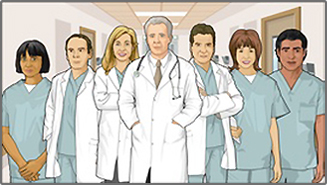Breastfeeding - self-care
Nursing mothers - self-care; Breast feeding - self-careAs a breastfeeding mother, know how to take care of yourself. Keeping yourself well is the best thing for breastfeeding your baby. Here are some tips about taking care of yourself.
- Eat to Stay Healthy and to Feed Your Baby
You should:
- Eat 3 meals a day.
- Try to eat foods from all the different food groups.
- Vitamin and mineral supplements are not a substitute for healthy eating.
- Know about food portions so that you eat the right amount.
Eat at least 4 servings of milk foods each day. Here are ideas for 1 serving of milk food:
- A cup (240 milliliters) of milk
- 1 cup (245 grams) of yogurt
- 4 small cubes of cheese or 2 slices of cheese
Eat at least 3 servings of protein-rich foods each day. Here are ideas for 1 serving of protein:
- 1 to 2 ounces (30 to 60 grams) of meat, chicken, or fish
- 1/4 cup (45 grams) cooked dried beans
- 1 egg
- 1 tablespoon (16 grams) of peanut butter
Eat 2 to 4 servings of fruits each day. Here are ideas for 1 serving of fruit:
- 1/2 cup (120 milliliters) fruit juice
- Apples
- Apricots
- Peaches
- 1/2 cup (70 grams) cut up fruit, such as watermelon or cantaloupe
- 1/4 cup (50 grams) dried fruit
Eat at least 3 to 5 servings of vegetables each day. Here are ideas for 1 serving of vegetables:
- 1/2 cup (90 grams) cut up vegetables
- 1 cup (70 grams) salad greens
- 1/2 cup (120 milliliters) vegetable juice
Eat about 6 servings of grains like bread, cereal, rice, and pasta. Here are ideas for 1 serving of grain:
- 1/2 cup (60 grams) cooked pasta
- 1/2 cup (80 grams) cooked rice
- 1 cup (60 grams) cereal
- 1 slice bread
Eat 1 serving of oil each day. Here are ideas for 1 serving of oil:
- 1 teaspoon (5 milliliters) oil
- 1 tablespoon (15 grams) low-fat mayo
- 2 tablespoons (30 grams) light salad dressing
Drink plenty of fluids.
- Stay hydrated when you are nursing.
- Drink enough to satisfy your thirst. Try to drink 8 cups (2 liters) of fluid each day.
- Choose healthy fluids such as water, milk, juice, or soup.
DO NOT worry about your food bothering your baby.
- You can safely eat any foods you like. Some foods may flavor your breast milk, but babies are often not bothered by this.
- If your baby is fussy after you eat a certain food or spice, avoid that food for a while. Try it again later to see if it is a problem.
##RemoveMe##
- Caffeine, Alcohol, Smoking, and Breastfeeding
Small amounts of caffeine will not hurt your baby.
- Limit your caffeine intake. Keep your coffee or tea at 1 cup (240 milliliters) per day.
- If you drink larger amounts of caffeine, your baby may get agitated and have trouble sleeping.
- Learn how your baby reacts to caffeine. Some babies may react to even 1 cup (240 milliliters) a day. If that happens, stop drinking caffeine.
Avoid alcohol.
- Alcohol affects your milk.
- If you choose to drink, limit yourself to 2 ounces (60 milliliters) of alcohol a day.
- Talk to your health care provider about drinking alcohol and breastfeeding.
Try not to smoke. There are many ways to help you quit.
- You put your baby at risk if you smoke.
- Breathing in smoke increases your baby's risk for colds and infections.
- Get help to quit smoking now. Talk to your provider about programs that can support you to quit.
- If you can quit, you will feel better and decrease your risk of getting cancer from smoking. Your baby will not get any nicotine or other chemicals from cigarettes in your breast milk.
Know about your medicines and breastfeeding.
- Many medicines pass into mother's milk. Most of the time, this is safe and OK for your baby.
- Talk with your provider about any medicines you take. DO NOT stop taking your medicine without first speaking to your provider.
- Medicines that were safe when you were pregnant may not always be safe when you breastfeed.
- Ask about drugs that are OK to take while you are breastfeeding. The American Academy of Pediatrics' Committee on Drugs keeps a list of these drugs. Your provider can look at the list and talk to you about medicines you take when breastfeeding.
##RemoveMe##
- Breastfeeding and Contraception
You can get pregnant when breastfeeding. DO NOT use breastfeeding for birth control.
You are less likely to get pregnant while breastfeeding if:
- Your baby is younger than 6 months old.
- You are breastfeeding only, and your baby does not take any formula.
- You have not yet had a menstrual period after having your baby.
Talk to your provider about birth control. You have lots of choices. Condoms, diaphragm, progesterone-only pills or shots, and IUDs are safe and effective.
Breastfeeding delays the return of normal menstrual periods. Your ovaries will make an egg before you have your period so you can get pregnant before your periods begin again.
##RemoveMe##
References
Dieterich CM, Felice JP, O'Sullivan E, Rasmussen KM. Breastfeeding and health outcomes for the mother-infant dyad. Pediatr Clin North Am. 2013;60(1):31-48. PMID: 23178059 www.ncbi.nlm.nih.gov/pubmed/23178059.
Feldman-Winter L. Evidence-based interventions to support breastfeeding. Pediatr Clin North Am. 2013;60(1):169-187. PMID: 23178064 www.ncbi.nlm.nih.gov/pubmed/23178064.
Holmes AV. Establishing successful breastfeeding in the newborn period. Pediatr Clin North Am. 2013;60(1):147-168. PMID: 23178063 www.ncbi.nlm.nih.gov/pubmed/23178063.
Newton ER. Lactation and breastfeeding. In: Gabbe SG, Niebyl JR, Simpson JL, et al, eds. Obstetrics: Normal and Problem Pregnancies. 7th ed. Philadelphia, PA: Elsevier; 2017:chap 24.
Valentine CJ, Wagner CL. Nutritional management of the breastfeeding dyad. Pediatr Clin North Am. 2013;60(1):261-274. PMID: 23178069 www.ncbi.nlm.nih.gov/pubmed/23178069.



